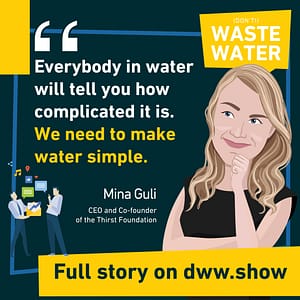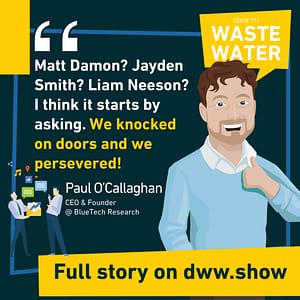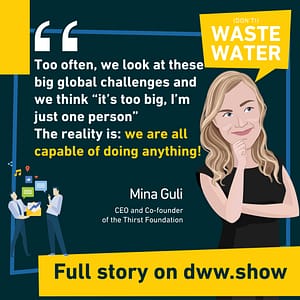Marketing often gets a bad rap in the Water Industry. There’s often this belief, that if a process or a product was really good enough, it would not need marketing.
Is it a consequence of the Water Sector being so rich in engineers? Or simply a symptom of the recurring challenge of the misperception of the real value of water? Who came first, the chicken or the egg?
Many questions, few answers? Let’s correct this ⬇️
Table of contents
The Water Industry is Terrible at Storytelling
I know, telling stories is only a portion of marketing. But if it was an iceberg, wouldn’t it be the emerged part or the easiest to spot?
So, what are the Water Stories we tell, our Water Narratives? And how could we improve?
Because let’s be honest right now:
People in the water space… It’s an orchestra, which is right now creating cacophonous noise!
Alexander Loucopoulos – Partner at SCIENS WATER
Indeed, we struggle to agree on a single message to share to move the water cause forward.
Mina Guli on my podcast microphone (and in a Pollination report) has been proposing “Close the Gap.”

Yet, the way it was received kind of just confirms Alex’s statement; it sounds like we’re still looking for our “Zero Carbon” flagship equivalent.
Water is a good field for jokes
The thing with Water, and especially Wastewater is that:
What we have learned, and I’m sure you’ve seen it as well, is that one of the occupational hazards of working in Wastewater is that we all basically devolve into our inner middle schooler. We start making jokes and puns about the nature of this work!
Aaron Tartakovsky – CEO & Co-Founder of EPIC CLEANTEC
I bet you’ve lived that experience in many countries, along with the recent CoVid pandemic. Wastewater-based epidemiology emerged as an interesting solution to detect outbreaks and monitor their severity or the variant involved.
Yet every time it was mentioned in the news, it inevitably turned into “Poo and Pee” jokes, what Denise Mall on that microphone elegantly qualified of “a colorful conversation.”

Water is the most unknown thing we touch every Day!
We could be laughing along if it did not have consequences:
99% of people have no clue about the quality of Water they drink. We have just been very privileged in our society to not have to think about the Water we drink, nor care about how much Water we use. And if you ask most people, I’ve had the lamest answer. Where do you think Water comes from? They’re like: it’s coming from a tap.
Meena Sankaran – CEO & Founder of KETOS
So if we agree on the finding, what can we do about it? Well, we can leverage one of the oldest psychological bias there is: the power of stories!
How can we advocate for Water through cultural narratives? Remember stories, shape belief, dictating action. Our stories tell us how to live. Just like Songlines in Australia. So what are our Songlines for Water? And how can we tell new stories? How can we tell new and positive stories that will reconnect us to Water?
Because that’s where it begins. And it begins with children and it begins with fun because between the carrot and the stick, the stick being “There’s no more water coming out of the taps.” And the carrot saying “water is sweet.” The carrot is a lot sweeter. I think that fun is a great motivator for change.
Michael Stanley Gallisdorfer
How to leverage the power of Stories?
Indeed, what do you remember from your childhood? I’d bet a good portion of it starts with “Once upon a time…”
Our brains love stories; they relax in stories, they love how “This, then that, while this” logically flows from A to B and creates a lasting impression on our memories. What Björn Otto summarized on my podcast microphone with “Facts Tell, Stories Sell.”
Now, there’s another piece of wisdom in what Michael just shared: how we have to play with the carrot and the stick.
Creating the sense of urgency, I think is absolutely essential. But at the same time showing not just that we can do it, that we are resilient, but how we can be resilient. I think that’s really key.
Alice Schmidt – Author of THE SUSTAINABILITY PUZZLE
So how do you strike a balance between carrot and stick?
Balancing Doom and Hope
I guess, it’s quite subjective. Yet, there’s a red threat between Alice Schmidt, Paul O’Callaghan, and Claudia Winkler‘s opinions:
It’s really important to keep this balance and to make sure that these very uncomfortable truths are heard and seen. Some people refer to this as apocalypse porn, which can also then of course, lead to certain fatigue. There’s of course the saying: “good news is bad news, and only bad news is good news.” And I think that’s true to an extent, but then in terms of what motivates people, I mean, we all know, we all love praise, right? We all love reinforcement of positive action.
Alice Schmidt – Author of THE SUSTAINABILITY PUZZLE
People wanted to move on from the doom and gloom narrative about Water and the apocalyptic tales that we hear and people were really ready to tell a different story, because those of us who are in the sector, we know that there is a different story. There are solutions to these challenges and solutions to these problems.
Paul O’Callaghan – CEO & Founder of BLUETECH RESEARCH

If you tell me the world is going down, I will not invest in your thing because you know, like I might die anyway. If you tell me, Hey, we can do it. I’m on board!
Claudia Winkler – Author of THE SUSTAINABILITY PUZZLE
Emotions sell – choose them wisely
Yes, it’s a fact; fear and anger theoretically work the best when it comes to making people react and change behavior. Yet:
There was no way that we, as individuals can solve this crisis, no matter how many short showers we take, how many times we turn off the tap when we brush our teeth. We cannot individually solve this crisis.
Mina Gulli – CEO & Founder of THIRST

So it’s not really about pushing people to change their direct behavior and attitude towards Water. It’s more about creating a water consciousness in them that will lead them to campaign for action, make a hard political decision popular, and put the right pressure on the right people.
Hence, we shall not look for fear and anger but rather for hope stories. That’s how we may move the silent majority in the middle
Lead with Hope
We can move the front and the tipping point. But if you forget about the 60% of the Gaussian bell curve in the middle, then actually you’re doomed to failure. If 20% are running and saying, yeah, it’s super, but you forget about the majority in the middle. It will not happen.
Claudia Winkler – Author of THE SUSTAINABILITY PUZZLE
So let’s craft the right stories, these songlines Michael alluded to, these positive examples Paul shares in his “Brave Blue World” Netflix hit.
And let’s then raise the awareness on a key point:
It’s also about recognizing your power to influence others, to influence your peers. I think this is huge. This is really, really important!
Alice Schmidt – Author of THE SUSTAINABILITY PUZZLE
Because Alice is right. We can all move the needle! We can all help to spread the word to this silent majority in the middle of the Bell Curve!
Water Marketing enables convincing People that disagree with you
For that, we may have to step out of our comfort zone:
If the only thing you take away today is starting to look at different perspectives, starting to speak with one person at the opposite spectrum of your opinion. Then every single second I invested in this talk was worth it. So I urge all of you open up, start talking to people who look at the world in a different view. It’s paying off. It might be painful, but it’s paying off.
Claudia Winkler
Do you need positive reinforcement to ensure you’re doing right and you shall speak up? Claudia again:
We humans are creative, we have all it takes. We just need to change the outcome! Where do we want to use our creativity for? We could use it to harm the planet. But we could use it to save the planet! Water is a good example. Energy is a great example. Economy should be embedded in the society and in our ecological system of the planet. And then if we achieve that, it’s a win-win win, win, win, win, win. You know, like everybody wins.
Claudia Winkler
What are we waiting for?

